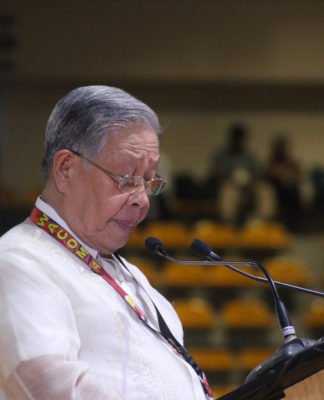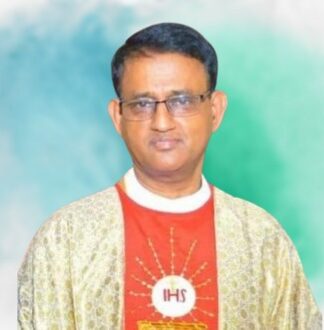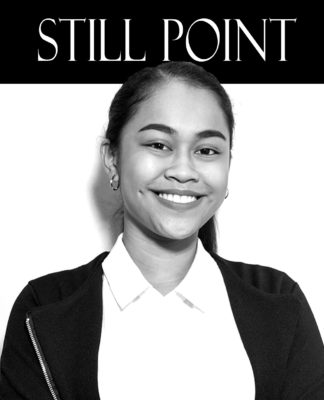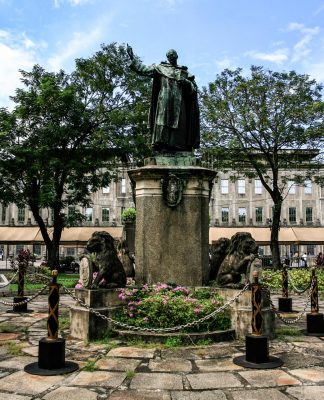CHARITY Anne Reyes and her batch mates are a “dying breed”.
They are the last of a group of students under the multi-disciplinary course offering an AB degree in Social Sciences and a BS in Secondary Education. But the program has been scrapped and Charity, an AB-BSE student who once admitted despising the heavy academic workload, is not exactly excited about it.
In her senior year as a History pre-service teacher, she eventually realized that the double load of student work she had endured for four years would be integral to her development as a more or less complete individual.
“Looking back at my experiences as an AB-BSE student, I find it hard to choose one that would stand out because all of them have an influence on who I am now,” said Charity, secretary of the Social Science Society.
Back story
AB-BSE, a collaboration between the Faculty of Arts and Letters (Artlets) and the College of Education, is a double-degree program covering all “professional subjects for education [and] areas of the social science such as political science, sociology, history, and economics.” Forty-eight freshmen enrolled in the program when it was first offered in school year 2002-2003.
This move, according to former Artlets Dean Armando de Jesus, was an effort to mold students using a multi-disciplinary approach.
“A graduate who can shift from one field to another is considered more valuable,” De Jesus told the Varsitarian in 2002.
The launch of the course was the beginning of “a wide-ranging curriculum that AB was pioneering”, referred to as the” vertical articulation program”, which is aimed to establish Artlets as a “service college” for nine education programs including literature, history, and humanities.
But in 2007, the two colleges announced its split and the “phasing out” of the program. According to Education Dean Clotilde Arcangel, the Commission on Higher Education (Ched) ordered “a tremendous increase in the number of units for Education”—a shift from 30 to 60 units. It would be a heavy load for the AB-BSE students, who were then carrying 60 units.
De Jesus added that the “new directives released by Ched will needlessly prolong the program” from eight semesters and three summers to a maximum of six years.
The “phasing out” was done gradually as the two colleges welcomed its fifth and last batch of AB-BSE students at the beginning of Academic Year 2007-2008, which—coincidentally—makes the group a part of the Quadricentennial batch of the University.
Two-road journey
For Charity’s blockmate and fellow officer Daryl Baes, being AB-BSE students meant answering the question “AB-BSE, ano ‘yun?” most of the time and inevitably being considered different from other students at Artlets.
“When you walk, people stare as if they find you good-looking, only to realize that they’re not looking at your face but at the patch on your uniform,” shared Daryl, the society president, in Filipino.
In their fourth year, society treasurer Kent San Felipe said AB-BSE students would go through a “much-awaited transformation” as they slip out of their Artlets to don their practicum wear, which goes in different colors like blue, orange, pink, and yellow.
But their being different went beyond what they wore. Franz Buendia, the society’s vice president for external affairs, added that their student life required them to go through a double load of sacrifice.
“[Who can forget] that thesis, which we had to write simultaneously with our practicum at the Education High School?” said Franz.
But Michelle Guiritan said she enjoyed her experiences as a double-degree student because “AB-BSE literally and figuratively took me to places.”
“AB-BSE, although stressful on so many levels, has allowed me to do [something that] I love—to travel,” said Michelle, adding that despite its costs, the trips have taught her to “travel with a purpose.”
Michelle and her classmates have been to provinces like Tarlac and Laguna, but their 11-day community immersion in Malinao, Aklan was something she could never forget.
“I had to live with a foster family, interview farmers, and then present a research output at a research colloquim in Aklan Catholic College,” she recalled. “Being the travel enthusiast that I am, the whole trip really thrilled me because we had to travel by land, sea, and air.”
Bittersweet adieu
Despite the hardships, Franz said that everything was worth going through, especially in the company of a closely-knit class that shared the same sentiments.
“Yes, it was difficult, but I was able to surpass all of it because I was happy with what I was doing and I knew that there were people who could wipe all the stresses away,” he said.
Franz added that he is sad that the “AB-BSE bloodline” will be cut short, but is certain that the dual-degree course will leave a permanent imprint in their personalities.
For Charity, the struggles have led to being proud of what she was able to learn and accomplish as an AB-BSE student. For instance, she has learned that teachers must put “saysay” or importance in the lessons to gain the interest of students who have short attention span.
“I’m proud of the style and manners I’ve learned in this course,” she said in Filipino. “And as we near our graduation and job application, I’ve come to realize that I want to teach.”
Quoting their professor Carlito Dalangin, Daryl said that their class enjoyed the best of both worlds because “in the Faculty of Arts and Letters, you are taught what to teach, while in the College of Education, you are taught how to teach.”
“AB-BSE itself is an advocacy of inspiring and leading the change in the Filipino community through education, research, and community service,” he added. “It is a short-lived program, [but it will leave in us] a pride that takes delight in serving and leading.” Margaret Rose B. Maranan and Alma Maria L. Sarmiento


















